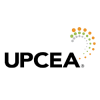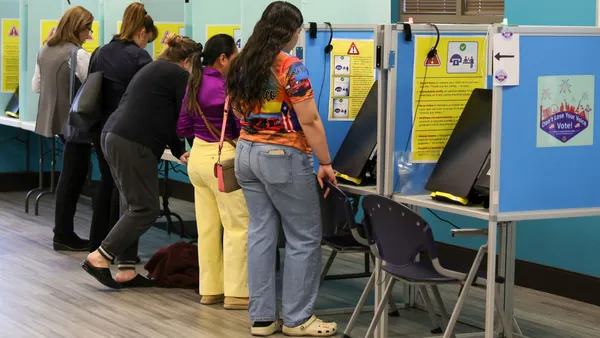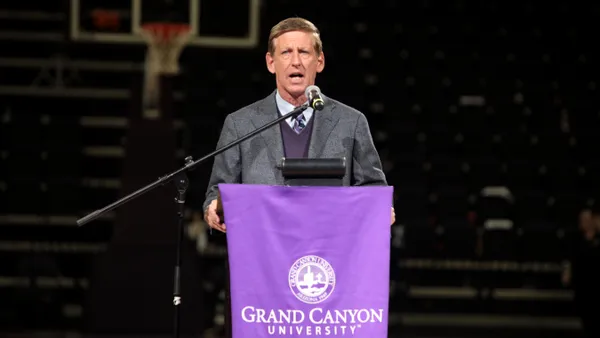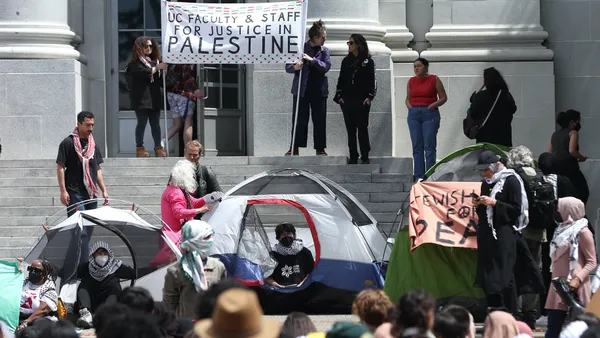Dive Brief:
- The U.S. Department of Education's accreditation advisory group voted in favor of agency staff's recommendation to terminate the recognition of the Accrediting Council for Independent Colleges and Schools.
- The National Advisory Committee on Institutional Quality and Integrity's recommendation to terminate recognition will be handed off to a senior department official, who will make the final decision. Eleven committee members voted in favor of pulling recognition and one member voted against.
- The embattled accreditor of for-profit colleges pushed back on the findings that formed the basis of the recommendation and said it has made several changes to its oversight process.
Dive Insight:
The merits of ACICS' federal recognition have been publicly debated since 2016, when the Obama administration pulled it following the collapse of two large for-profit college chains it oversaw. The Trump administration reinstated its approval of the accreditor in 2018.
But the department has continued to find ACICS out of compliance with several of its regulations. It's not the only entity to raise concerns. An accreditation industry group committee recommended denying ACICS its own endorsement; the accreditor responded by rescinding its application to be considered.
The Ed Department staff recommendation was delivered in a series of reports in January that said the accreditor hadn't fulfilled key oversight requirements, including around the efficacy of its training for site visitors, its ability to monitor institutions and its financial health. Two of the reports were commissioned by former Education Secretary Betsy DeVos in order to reinstate recognition.
A USA Today investigation last year highlighted some of those concerns. It found evidence that an ACICS-accredited institution appeared to lack students and faculty, and that the accreditor was unaware. The department report pointed to that situation as an indication ACICS lacks "the administrative capacity to carry out its accreditation activities."
ACICS contested the department's findings during virtual deliberations on Thursday and Friday. ACICS President Michelle Edwards contended the accreditor has come into full compliance with department requirements, and charged that the criticisms against ACICS were fueled by "activist groups and political opponents of career colleges."
Deliberations on ACICS' fate extended into Friday to give committee members time to review a report published this week by the department's internal watchdog. It highlights concerns about overinvolvement by political staff during the Obama administration's probe of ACICS. A federal court sided with ACICS on its challenge of the 2016 decision, which concluded that all evidence was not considered. The court handed the decisions back to the department under DeVos for reconsideration.
The report also vetted a subset of the 19 accreditation criteria the DeVos administration found ACICS compliant on of the 21 considered, and said the decisions were supported by the evidence supplied. The report focused on the department staff's process and didn't take issue with its findings.
Antoinette Flores, acting vice president of postsecondary education at the Center for American Progress, who spoke during the meeting in favor of dropping ACICS, defended the staff's involvement. "When an agency loses recognition. It requires the cooperation and coordination of the entire department," Flores said.
ACICS' membership has dwindled in recent years, from around 250 institutions in late 2016 to around 60 institutions today.
A handful of committee members, when casting their vote in favor of terminating ACICS' recognition, said they hoped the standards applied to ACICS during the deliberations would be applied to accreditors broadly. Some said they felt the watchdog report was relevant to the proceedings, while others disagreed. The single vote against terminating recognition came from Robert Mayes, a for-profit college executive.
Votes on ACICS' compliance with criteria across four department reports showed more nuance in committee members' view of ACICS. For instance, a vote to affirm that the accreditor lacked the financial resources to carry out its mission didn't pass, with Arthur Keiser, NACIQI chair serving as a tie-breaking vote. Keiser is head of Keiser University, which converted from for-profit to nonprofit status about a decade ago. Meanwhile, all 12 voting participants found ACICS out of compliance with the department's standards for distance education.
ACICS' membership has dwindled in recent years, from around 250 institutions in late 2016 to around 60 institutions today.
Jordan Matsudaira, a recent department political appointee, will review the NACIQI and department staff recommendations and make a final decision on ACICS within 90 days. ACICS can appeal the decision to the department secretary. If ACICS loses the appeal or otherwise loses recognition, the colleges it oversees would need to find another accreditor within 18 months in order to continue to receive federal aid.
Representatives from ACICS and Career Education Colleges and Universities, a trade group that represents for-profit colleges, did not immediately respond to Higher Ed Dive's request for comment Friday.
















